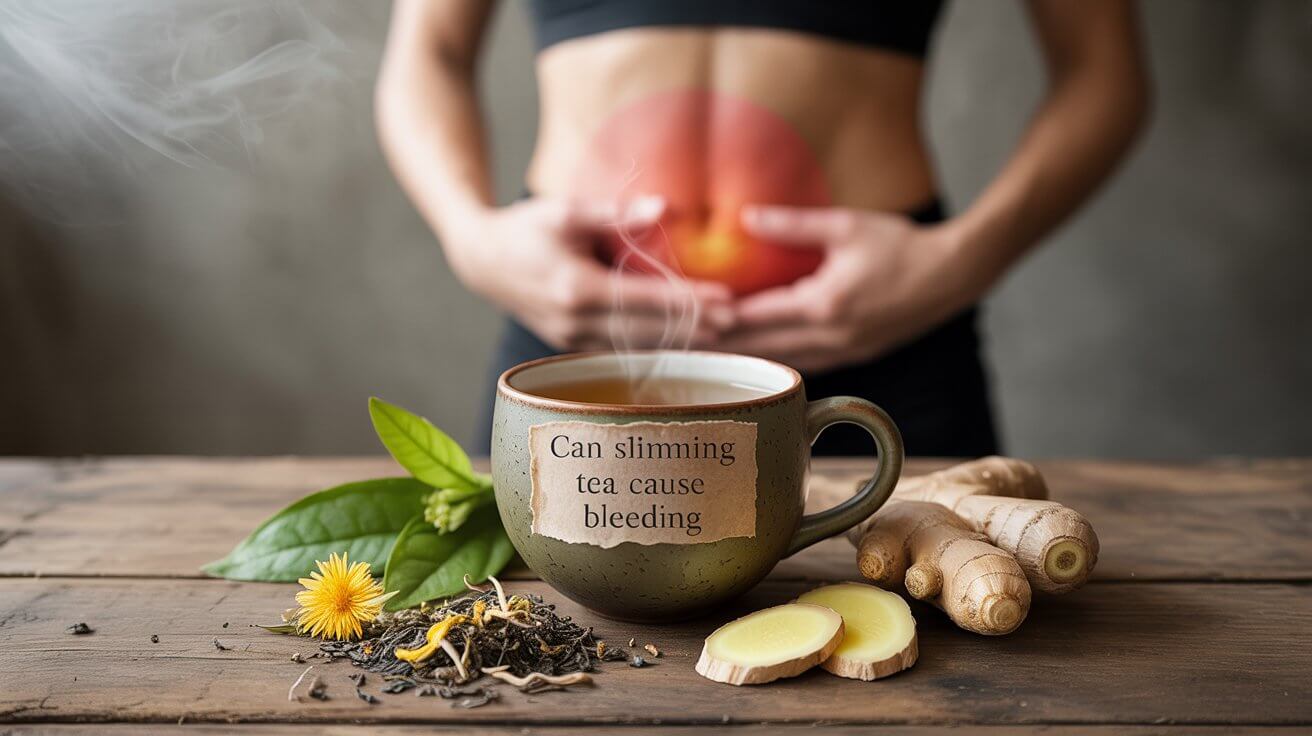Slimming teas remain a hot trend in 2025 marketed as fast, natural solutions for weight loss, detox, and bloating relief. Many promise a flatter tummy, faster metabolism, and visible results within days. But behind these quick fixes lies a serious question many users are now asking:
Can slimming tea cause bleeding or affect your health?
The short answer: Yes, some slimming teas can cause bleeding or other complications, particularly if they contain harsh laxatives, hormonal herbs, or strong diuretics. Let’s break down how this happens, what recent studies say, and what safer options you can use instead.
How Slimming Teas Work (and Why They Can Be Risky)
Slimming teas are often marketed as “detox” or “fat-burning” blends, but many rely on temporary water loss or bowel stimulation rather than actual fat reduction. Most formulas include:
-
Senna leaves – a stimulant laxative that increases bowel activity.
-
Green tea extract – boosts metabolism and enhances fat oxidation.
-
Dandelion root – acts as a natural diuretic to flush out excess water.
-
Caffeine – raises alertness and may suppress appetite.
-
Garcinia cambogia or oolong tea – sometimes added to boost calorie burn.
While these ingredients can produce short-term results, overuse can strain your digestive and hormonal systems.
2024 Review (Journal of Herbal Nutrition): Over 30% of frequent detox tea users reported gastrointestinal discomfort, and 12% experienced irregular menstrual cycles or bleeding within three months of use.
Can Slimming Tea Cause Bleeding?
Bleeding related to slimming tea is not common but medically recognized. It can happen through several mechanisms:
1. Digestive Tract Irritation
Many slimming teas contain senna, cascara, or rhubarb root strong laxatives that irritate the intestinal lining. Over time, this may lead to inflammation, tiny tears, or rectal bleeding, especially in those with hemorrhoids or IBS.
Tip: If you notice dark or bloody stools after using a detox tea, stop immediately and consult a doctor.
2. Menstrual Irregularities or Heavy Flow
Certain herbs, such as licorice root, ginseng, or fennel, can subtly affect hormone balance and uterine activity. In some women, this causes heavier or irregular periods.
A 2025 analysis in Frontiers in Reproductive Health found that herbal teas containing phytoestrogens can stimulate uterine contractions, which may worsen bleeding in sensitive users.
3. Worsening of Existing Conditions
If you already have digestive issues like ulcers, colitis, Crohn’s disease, or hemorrhoids slimming teas can intensify inflammation and trigger bleeding.
Similarly, if you’re prone to heavy menstrual cycles or are on blood-thinning medications, herbal teas with ginger, garlic, or ginkgo can increase the risk of bleeding.
Other Side Effects Reported in 2024–2025
According to recent user reviews and medical reports, side effects from frequent slimming tea use may include:
-
Abdominal cramps or chronic diarrhea
-
Electrolyte imbalance and dehydration
-
Anxiety, heart palpitations, or insomnia (due to caffeine)
-
Reduced nutrient absorption
-
Hormonal disruptions in women
Expert Insight: The main problem isn’t tea itself, but the intensity and frequency of ingredients like senna or caffeine. When taken daily or long-term, even “natural” teas can disrupt your body’s balance.
Who Should Avoid Slimming Teas Entirely
You should avoid slimming teas if you are:
-
Pregnant or breastfeeding (risk of uterine stimulation)
-
On medication (especially anticoagulants, antidepressants, or diuretics)
-
Living with IBS, ulcers, or hemorrhoids
-
Prone to heavy menstrual bleeding or hormonal sensitivity
-
Underweight or prone to dehydration
For these groups, detox teas can do more harm than good.
Safer and Research-Backed Alternatives
If you’re looking for sustainable weight management, focus on balanced metabolism support rather than harsh detoxing.
A better choice is All Day Slimming Tea, which contains green tea, oolong, and ginger ingredients shown to support fat metabolism, gut balance, and gentle detoxification without strong laxatives.
Unlike typical “flat tummy” teas, it works with your body’s rhythm helping you burn calories, reduce bloating, and stay energized safely.
Visual Guide (Suggested Addition)
A simple comparison table or infographic can be added here showing:
| Tea Type | Main Ingredients | Common Effect | Risk Level |
|---|---|---|---|
| Typical Slimming Tea | Senna, caffeine | Rapid water loss | 🔴 High |
| Gentle Herbal Tea | Peppermint, chamomile | Digestion & relaxation | 🟢 Low |
| All Day Slimming Tea | Green tea, oolong, ginger | Fat metabolism & detox | 🟢 Low |
This visual comparison helps readers instantly grasp which teas are safer and why.
Key Takeaways
-
Yes, slimming teas can cause bleeding in some individuals especially when overused or combined with existing health issues.
-
The most common causes include intestinal irritation, hormonal effects, and pre-existing digestive conditions.
-
Always check ingredient labels and avoid products with senna, cascara, or artificial additives.
-
Opt for balanced herbal blends and focus on long-term health rather than quick results.
Expert Summary
In 2025, doctors and nutritionists increasingly warn that “natural” doesn’t always mean safe. Slimming teas are best used cautiously or replaced entirely with gentler, metabolism-supporting blends.
If your goal is sustainable weight loss, combine hydration, light exercise, and herbal teas like All Day Slimming Tea that nourish your system rather than shock it.


Leave a Reply